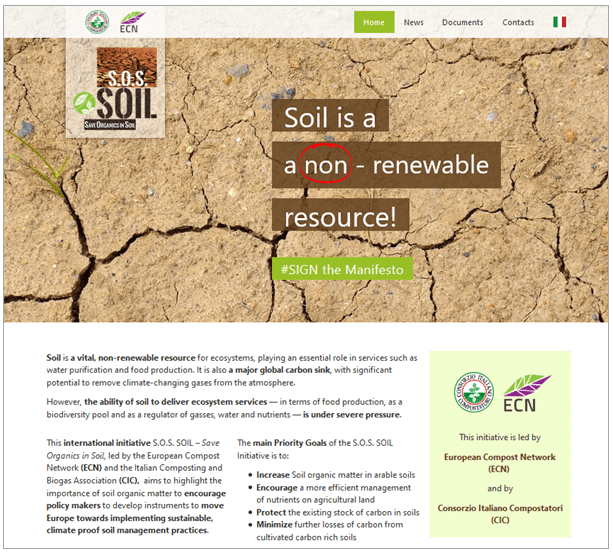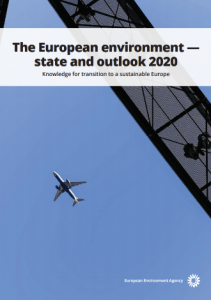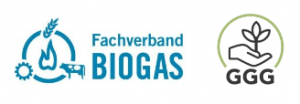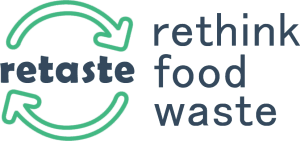|
In co-operation with the Italian Composting and Biogas Association (CIC) the European Compost Network has launched a new website on the S.O.S. initiative ‘Save Organics in Soil’.
http://saveorganicsinsoil.org
The website ’saveorganicsinsoil.org’ includes news of the S.O.S. initiative and provides background information on soil organic matter, scientific articles on soil, climate change, C-sequestration and guidelines for the beneficial use of compost and digestate on soils.
Supporters of the S.O.S. initiative can sign the manifesto ‘Save Organics in Soil’ online. The signatures will be published on the website. Please sign the manifesto here.


EEA/EESC
SOER 2020 - The State of European Environment
On 13 February 2020 Hans Bruyninckx, EEA Executive Director, presented the key findings of the EEA report ’ The European environment — state and outlook 2020: knowledge for transition to a sustainable Europe (SOER 2020)’ at the event ’SOER 2020: Civil society's role for a just (and fast) transition towards sustainability’ hosted by the European Economic and Social Committee (EESC) Sustainable Development Observatory and the European Environment Agency (EEA) in Brussels.
 Based on the findings it is clear, that Europe will not achieve its 2030 goals without urgent action during the next 10 years to address the alarming rate of biodiversity loss, increasing impacts of climate change and the overconsumption of natural resources. The European Environment Agency’s Executive Director, Hans Bruyninckx (EEA) stated: Based on the findings it is clear, that Europe will not achieve its 2030 goals without urgent action during the next 10 years to address the alarming rate of biodiversity loss, increasing impacts of climate change and the overconsumption of natural resources. The European Environment Agency’s Executive Director, Hans Bruyninckx (EEA) stated:
‘Europe’s environment is at a tipping point. We have a narrow window of opportunity in the next decade to scale up measures to protect nature, lessen the impacts of climate change and radically reduce our consumption of natural resources’.
SOER 2020 is the most comprehensive environmental assessment ever undertaken on Europe. It provides a stark snapshot of where Europe stands in meeting 2020 and 2030 policy targets as well as longer term 2050 goals and ambitions to shift to a sustainable, low carbon future. The report notes that Europe has already made significant progress over the past two decades in terms of climate change mitigation, reducing greenhouse gas emissions. Signs of progress are also evident in other areas, such as tackling air and water pollution and the introduction of new policies to tackle plastic waste and bolster climate change adaptation and the circular and bio-economy.
While these achievements are significant, Europe will not achieve its sustainability vision of ‘living well within the limits of the planet’ by continuing to promote economic growth and seeking to manage the environmental and social impacts. The report urges European countries, leaders and policymakers to seize the opportunity and use the next decade to radically scale up and speed up actions to put Europe back on track to meeting its medium and longer-term environmental policy goals and targets to avoid irreversible change and damage.
The background paper of the EESC and EEA event can be downloaded here.
The press release on the publication of the SOER 2020 can be downloaded here.
The website ‘SOER 2020’, the report and key findings can be accessed here.

European Compost Network (ECN)
Feedback on the Roadmap on a Climate Law
The European Compost Network (ECN) welcomes the new initiative of the European Commission on a Climate Law that will provide for a long-term framework to the EU climate policy and contribute to the implementation of the Paris Agreement. Since the initiative aims to transform the way EU policies are made and to lay down fundamental elements that guide all policies, ECN is worried and concerned that the roadmap does not address in any of its parts the contribution of closed material loops – i.e. circular economy – to decarbonizing the economy.
ECN calls on the Commission to carefully design its climate policy to incentivise the take-up of climate-friendly and sustainable practices, products and technologies. Reuse and recycling should be prioritised over extraction of raw materials, which is a very polluting and energy intensive economic activity.
If the transition to a climate neutral economy is to be irreversible, organic cycles for biological materials must be closed. There is the need to develop a comprehensive strategy to build up organic matter in soils. Organic matter will help maintaining and restoring soil quality, structure and its much-needed water retention capacity. This means that soils will not dry out quickly in summer months, when water is scarce but also that the likelihood of flooding in winter is reduced.
A healthy soil also works as a huge carbon sink and therefore it can sequester even more carbon. Once applied to soils through compost and digestate, organic matter ensures carbon storage for many decades. ECN calls the Commission to propose an EU mandatory target to build up soil organic matter.
Timeline
The proposal for a climate law is expected to be discussed and potentially adopted by the College of Commissioners on 26 February 2020. Once presented, the proposal would be communicated to the European Parliament and the Council, and would follow the ordinary legislative procedure.
Member State Ministers are provisionally scheduled to discuss the Climate Law on 5 March 2020.
The Commission is expected to present its proposal to the European Parliament on 9 March 2020.
The complete version of ECN’s feedback on the Roadmap on a Climate Law can be accessed here.

EU Commission
Roadmap on Farm to Fork published
The European Green Deal cannot be achieved without addressing the issue of food sustainability. European citizens’ health, the planet’s environmental health and the economic and social health of coastal and rural areas go hand in hand. Therefore, the Commission has published the Roadmap on the Farm to Fork Strategy on 17 February 2020.
The European Commission announced, as part of its Green Deal Communication adopted on 11 December 2019, that the Farm to Fork Strategy, to be presented in spring 2020, will illustrate the objectives and actions necessary to secure a fair, healthy and environmentally-friendly food system. The strategy will combine both regulatory and non-regulatory initiatives to reach its objectives. The Common Agricultural Policy and the Common Fisheries Policy will be key tools to support the strategy.
The strands of the Green Deal are strongly interlinked and mutually reinforcing. In particular, the Farm to Fork Strategy has strong connections with and directly contributes to the new Circular Economy Action Plan, the 2030 EU Biodiversity Strategy, the Forestry Strategy, the EU Climate ambition and the Zero Pollution Strategy.
The EU has committed to the 2030 Sustainable Development Agenda and to being a frontrunner in its implementation. Food related targets run throughout the United Nations Sustainable Development Goals and the Farm to Fork Strategy will play a pivotal role in their implementation.
Please provide your feedback to the Roadmap until 16 March 2020. The roadmap on the Farm to Fork strategy can be accessed here.
Further information on the Farm to Fork Strategy is available on the Commission’s website.

Announcements
4-5 March 2020, Brussels (BE)
ECN Joint Task Group Meeting on Quality Assurance and Fertilisers
Under the title ‘Benchmarking national quality assurance schemes for compost and digestate Fertiliser Product Regulation and the standardisation process: ECN’s approach and critical aspects’ ECN is organising a 2-days workshop for its members on 4-5 March 2020 in Brussels.
ECN members, who are interested to join the workshop and have not yet signed in for the specific Task Groups, please contact the ECN Office: info@compostnetwork.info

10-12 March 2020, Frankfurt (DE))
Study Tour on ‘Bio-waste – Management Options from Composting to Energy Production’
On 12 March 2020 ECN will take part in the study tour ‘Bio-waste –Management options from composting to energy production’ organised under the umbrella of the export initiative for environmental technologies of the German Ministry of Environment by presenting good practices und legislative approaches on bio-waste management in Europe.
In co-operation with the German Chamber of Industry and Commerce and the Chamber of Industry and Commerce of Croatia (AHK Croatia) a delegation of 25 participants from municipalities, consultancies and academic institutions will visit different composting and anaerobic digestion plants in Germany. During the study tour, presentations will be given to introduce bio-waste management practices, regulations and quality assurance schemes for compost and digestate.
Further information on the export initiative and on the study tour can be accessed here.
Please find the programme of the study tour here.

17-19 March 2020, Waldenburg (DE)
German Anaerobic Digestion Day and Seminar
ECN will take part in the Anaerobic digestion Day organised by the German Quality Assurance Organisation (GGG) and the Fachverband Biogas on 18th March 2019. ECN’s Executive Director Stefanie Siebert will report about ‘Cross-border marketing of compost and digestate-based products in relation to the new EU Fertilising Product Regulation.
The seminar will focus on the first day on the legal requirements to treat food waste in anaerobic digestion plants and includes an outlook on the future developments of the biogas sector in Germany. The second day relates to biomethane production and technical requirements on the operation of biogas pants and the day will be closed with a session on the impact of EU policies. On the third day a study tour to two anaerobic digestion plants will follow.
The programme of the German Anaerobic Digestion Day can be accessed here.


23-25 April 2020, Athens (GR)
RETASTE: Rethink Food Waste Conference - Call for abstracts open until 29th February 2020
The RETASTE Conference initiates the dialogue for innovative solutions and optimization schemes that exploit significant opportunities for food waste reduction, reuse, and recycling at all stages of the food life cycle, as well as their scalability and commercial translatability. In parallel, RETASTE aims to address the social aspects of food waste issues, as well as to highlight ways to tackle social and perception barriers against reducing our environmental footprint, thus shifting the evolving future of social, market, and global megatrends.
The call for abstracts is open until 29th February 2020. Further information on the conference can be accessed here.


14-17 September 2020, Cambridge (UK)
RAMIRAN - Call for abstracts open until 1st March 2020
The RAMIRAN 2020 under the title ‘Managing Organic Resources in a Changing Environment’ is scheduled from 14th to 17th September 2020 in Cambridge (UK). The call for abstracts and registration is now open. Abstracts can be submitted until 1st March 2020. Further information and details on registration and abstract submission can be found on the conference website https://www.ramiran2020.org/.
|